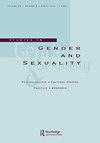The Thing About the Other, or What We Can Hear in Leaving Neverland
Q3 Social Sciences
引用次数: 0
Abstract
ABSTRACT This article explores how what appears to be a weakness or limitation of the film Leaving Neverland—hearing only from the victims, being one-sided in its investigation, lack of empirical evidence, narratively episodic—proves to be the film’s greatest strength. More precisely, the film’s patient and hyper focus on the victim’s speaking, coupled with editing decisions to prolong certain points of emphasis, creates the uncanny effect that Jacques Lacan termed das ding, which, therein, has the effect of gesturing to another scene, indeed, the very scene that cannot be seen but that can be heard, and that thus implicates Michael Jackson’s guilt and the victims’ (real) trauma.关于他人的事情,或者我们在离开梦幻岛时能听到的
本文探讨了电影《离开梦幻岛》的弱点或局限——只听到受害者的声音、片面的调查、缺乏经验证据、叙事情节——如何成为电影最大的优势。更准确地说,影片对受害者说话的耐心和高度关注,加上剪辑决定延长某些重点,创造了雅克·拉康(Jacques Lacan)称之为“das ding”的不可思议的效果,在这里,它具有指向另一个场景的效果,确实,这个场景看不见,但可以听到,因此暗示了迈克尔·杰克逊的内疚和受害者的(真正的)创伤。
本文章由计算机程序翻译,如有差异,请以英文原文为准。
求助全文
约1分钟内获得全文
求助全文
来源期刊

Studies in Gender and Sexuality
Social Sciences-Gender Studies
CiteScore
0.80
自引率
0.00%
发文量
15
期刊介绍:
Beginning in the final two decades of the 20th century, the study of gender and sexuality has been revived from a variety of directions: the traditions of feminist scholarship, postclassical and postmodern psychoanalytic theory, developmental research, and cultural studies have all contributed to renewed fascination with those powerfully formative aspects of subjectivity that fall within the rubric of "gender" and "sexuality." Clinicians, for their part, have returned to gender and sexuality with heightened sensitivity to the role of these constructs in the treatment situation, including the richly variegated ways in which assumptions about gender and sexuality enter into our understandings of "normality" and "pathology."
 求助内容:
求助内容: 应助结果提醒方式:
应助结果提醒方式:


